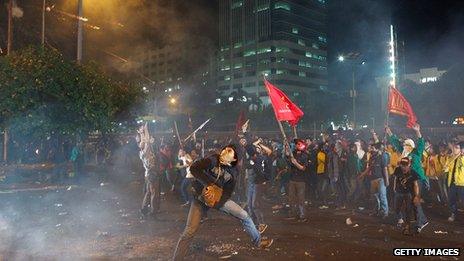Fossil fuel subsidies 'reckless use of public funds'
- Published

Fuel subsidies to US farmers amounted to $1bn in 2011 says the ODI
The world is spending half a trillion dollars on fossil fuel subsidies every year, according to a new report.
The Overseas Development Institute (ODI) says rich countries are spending seven times more supporting coal, oil and gas than they are on helping poorer nations fight climate change.
Some countries including Egypt, Morocco and Pakistan, have subsidies bigger than the national fiscal deficit.
The new report, external calls on the G20 to phase out the payments by 2020.
While there is no globally agreed definition of what a fossil fuel subsidy actually is, the report draws on a range of sources from the International Monetary Fund to the International Energy Agency.
It details the range of financial help given to oil, coal and gas producers and consumers from national governments and through international development.
What emerges is a complicated web of different types of payments in different countries.
Fossil funding
In the United States, for example, the government in 2011 gave a $1bn fuel tax exemption to farmers, $1bn for the strategic petroleum reserve and $0.5bn for oil, coal and gas research and development.
Germany gave financial assistance totalling 1.9bn euro to the hard coal sector in the same year.
And the UK gave tax concessions worth £280m in 2011 for oil and gas production.
The report accuses rich governments of "shooting themselves in both feet" by undermining attempts to put a price on carbon and by giving no incentive to companies to switch from high carbon fuels.
"This is a reckless use of public money at a time when people are very concerned about energy costs," Kevin Watkins, executive director of the ODI, told BBC News.
"Why are we spending $112 per adult in the OECD countries subsidising an energy system that is driving us towards dangerous climate change when there are alternatives?"
In developing countries, the report says the subsidies often take the form of keeping fuel prices low to help alleviate poverty.
Governments in Indonesia, Pakistan and Venezuela are spending twice as much on fossil fuel subsidies as they are on public health.
"Almost all these subsidies go to those who are connected to the grid because the governments give money to the energy providers, who pass it on to consumers.

Changes to fuel subsidies in Indonesia lead to rioting earlier this year
"The top 20% of these societies get around half of the total subsidy package," said Kevin Watkins.
International finance for development is hugely focussed on oil, coal and gas. According to the ODI, 75% of energy project support from international banks went to fossil fuel projects in 12 of the highest emitting developing nations.
The research adds to data from the International Energy Agency, external that says global subsidies for fossil fuels are six times higher than those for renewable energy. The OECD has stated that coal is subject to the lowest levels of taxation.
The ODI hopes that enough countries in the G20 group will follow up on promises made to look at the issue.
The institute believes that subsidies for energy are similar to subsidies for agriculture that plagued international trade negotiations in the 1990s.
Ultimately, agreement was found on removing them. The ODI believes there can be a similar outcome for fuel supports.
"This has to be the mother of all win-win scenarios," said Kevin Watkins.
"You'd have a win for taxpayers, a win for governments north and south and you'd have a win for the planet as well."
Follow Matt on Twitter @mattmcgrathbbc, external.
- Published6 November 2013
- Published5 November 2013
- Published4 November 2013